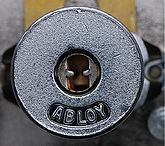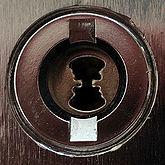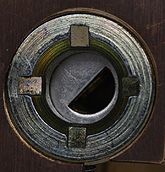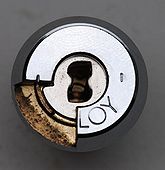Testing-mgsecure: Difference between revisions
| Line 101: | Line 101: | ||
{{Stub}} | {{Stub}} | ||
</nowiki> | |||
</pre> | |||
=== Reference citation === | |||
<pre> | |||
<nowiki> | |||
In 1932, the company started manufacturing Japan's first cylinder lock, | |||
the Manchurian lock.<ref>https://www.goal-lock.com/company/history.html GOAL company history</ref> | |||
== References == | |||
{{reflist}} | |||
</nowiki> | </nowiki> | ||
</pre> | </pre> | ||
Revision as of 16:25, 26 January 2023
This page being used for testing and development
Boilerplate templates
NOTE: you can get formatting help here: https://www.mediawiki.org/wiki/Help:Formatting
Image upload summary
{{Information
| Description=[[LOCK NAME]] image caption
| Date=25 Jan 2023
| Author=AUTHOR
| Source=Submitted to Lockwiki by Author
| Permission=Licensed under Creative Commons Attribution/Share-Alike 3.0
}}
{{Cc-by-sa-3.0}}
[[Category:MANUFACTURER]] [[Category:LOCK TYPE]] etc.
Lock page
<span style="font-size: 188%; line-height:190%">{{PAGENAME}}</span>
----
{{Lock model
| name = LOCK NAME
| Img = File:FILENAME
| Img_size = 200
| maker = [[MAKER]]
| lock_type = [[Padlock]] or [[Cylinder]] etc.
| lock_design = [[Pin-tumbler]], [[Dimple]] etc.
| spec_on = "yes" or BLANK
| spec_comptype = [[COMPONENT TYPE]]
| spec_comp = COMPONENT COUNT
| ratings = [[SECURITY RATING]]
| patent = (patent info)
| related = [[RELATED LOCK]]
}}
__TOC__
The '''MODEL''' is a [[pin-tumbler]] padlock made by [[MAKER]].
<!-- == Principles of operation == -->
<!-- == Model variations == -->
<!-- == Construction == -->
<!-- == Disassembly instructions == -->
<!-- == Vulnerabilities == -->
<!-- == Gallery == -->
<br clear="all">
<!-- == External links == -->
<!-- == See also == -->
<!-- == References == -->
[[Category:CATEGORY]]
[[Category:Lock models]]
{{Stub}}
Manufacturer page
<span style="font-size: 188%; line-height:190%">{{PAGENAME}}</span>
----
{{Lock manufacturer
| Name = MANUFACTURER
| Img = File:LOGO_FILENAME
| Img_size = 200px
| Headquarters =
| Founded =
| Founder =
| Products = [[Cylinder|Lock cylinders]]
}}
'''MANUFACTURER''' is a [[Lock Manufacturers|lock manufacturer]] that produces lock [[cylinder]]s.
__TOC__
<!-- == History == -->
== Lock listing ==
<!-- == Gallery == -->
<!-- == External links == -->
<!-- == References == -->
<!-- <references /> -->
== See also ==
* [[Lock Manufacturers]]
<!-- NOTE: Maker must be added manually to the Lock Manufacturers page -->
[[Category:MANUFACTURER]]
[[Category:Lock Manufacturers]]
{{Stub}}
Reference citation
In 1932, the company started manufacturing Japan's first cylinder lock,
the Manchurian lock.<ref>https://www.goal-lock.com/company/history.html GOAL company history</ref>
== References ==
{{reflist}}
Disassembly instructions edit
Original: To disassemble a double euro cylinder, use of a pinning shoe is the preferred method. Other possibility is to use a segmented follower, but that requires that both cores are pulled out a bit to allow a cam removal. Then a core should be rotated to approximately 4:30 or 7:30 o'clock position (135 degrees either clockwise or anti-clockwise) to prevent driver entering a gaps for the cam clutch. Then a segmented follower can be used to remove the core.
Proposed edit:
For Euro Profile page:
The use of a pinning shoe is the preferred method for disassembling a double euro cylinder. STEPS?
Another method is to use a segmented follower. The c-clips retaining both cores must first be removed and then both cores can be pulled out slightly in order to remove the center cam. One core should be rotated 30-45 degrees either clockwise or counter-clockwise -- once the cam is removed. This allows the core to be removed without driver pins entering gaps for the cam clutch. At that point, a segmented follower can be used to remove the core.
Locks not intended for installation and use can be disassembled in a quick but destructive procedure. The cylinder housing itself can be cut in the middle using a hacksaw or grinder. The cam will no longer be held in place and can be removed. The resulting two cut half euro cylinders can then be disassembled as outlined above.
For individual lock page:
TBD









































































































































































